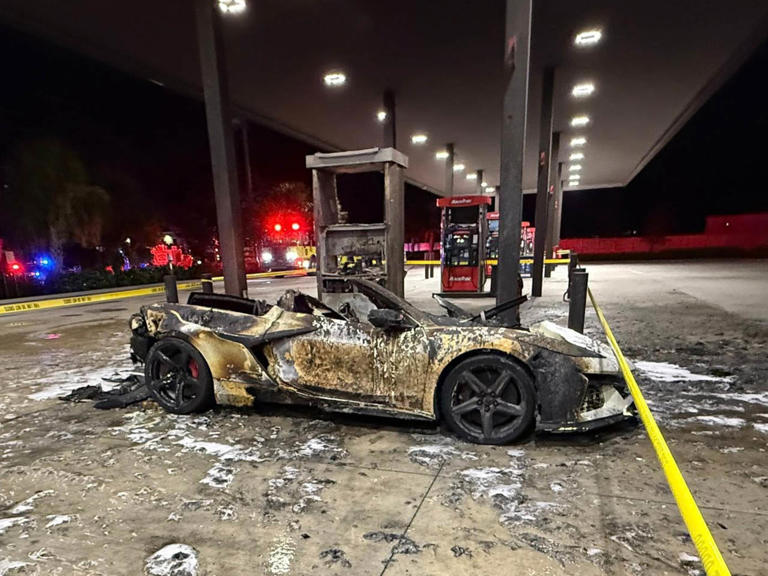Shawn Conner was refueling his high-end 2024 Corvette at a gas station in early June when the car spontaneously caught on fire, torching it in a matter of minutes.
Conner turned to a Facebook group of Corvette enthusiasts. A video he posted showed the supercar exploding out of the blue, sending a person at a nearby gas pump scattering away.
“Anybody have any experience, or ever heard of anything like this before?” Conner asked. “Car exploded while pumping gas. I have an idea, but would love to hear what everyone else thinks.”
Conner declined to comment. GM said it couldn’t comment on the specific situation.
Similar incidents caught the attention of an employee at General Motors, which makes the Chevrolet Corvette. Another social-media post identified multiple cars that had burst into flames while pumping gas during a 30-day period. Later that week, a GM-owned Corvette test vehicle also caught fire, a company report said.
For the next few months, GM dug into the problem to determine whether this pattern of explosions was related to a defect. And then last month, GM made a determination, recalling the vehicles over an unusual issue: In some Corvettes, a cooling fan that runs even after the car has been shut off could blow spilled gas on the engine and catch fire.
GM said the issue is a rare occurrence, and faulty filling-station pumps that don’t automatically stop appear to be a contributing factor. The recall affects more than 23,000 Corvettes that start at over $100,000 and are among the fastest cars ever made by GM.
Owners shelling out six-figure sums for a high-end supercar may think they are immune from the sort of dangerous defect affecting these Corvettes. But the issue is a stark example of how even the priciest cars on the market today can be dragged down by a safety recall.
“The safety of our customers is the highest priority for the entire GM team, and we’re working to remedy this matter as quickly as possible,” GM said.
The affected Corvette models—the Z06 and the ZR1 versions from recent model years—are sought after supercars, with the latter being able to reach 233 mph, said Keith Cornett, senior editor of CorvetteBlogger.com
“They’re obviously a little perplexed,” Cornett said of impacted Corvette owners. “They want a safe car to be in, but many of them—I know several 2023 owners—say ‘I filled up my car 100 times now and have never had any issues.’”
Safety defects tied only to when a driver pumps gas is rare. In 2009, Chrysler issued a recall for 19,000 Dodge Durangos with a faulty valve that could allow some fuel to escape at the end of refueling, potentially leaking onto an ignition source. Nissan recalled 192,000 vehicles in 2005 because of a hose that might crack from exposure to ozone, which could result in fuel leakage while refueling.
Michael Brooks, executive director of the Center for Auto Safety, said one potential issue is that a driver might encounter a faulty gas pump that doesn’t automatically shut off but not realize it.
“How do you know when it’s safe to drive off from a fuel pump if you’ve had one of these overpump incidents?” he said. “There’s not a whole lot of guidance on how to approach what you should do.”
GM said that signs a pump may be malfunctioning include visible damage, the presence of leaked fuel, or any absorbent material on the ground near the pump from prior spills. The automaker advises owners to follow fueling instructions in their owner’s manual, turn off the vehicle’s engine during refueling, confirm the fuel nozzle is completely inserted into the vehicle while pumping gas and never top off after the fuel pump’s automatic shut-off clicks once.
GM has developed a fix, a shield that would divert spilled fuel, and is working to finalize supplier production and distribution plans. The remedy part is expected to be available in the next several weeks, a person familiar with the matter said.
Before the recall was issued, nearly 1,600 affected Corvettes were on dealer lots, according to ChevyBlogger.com’s Cornett. GM issued a stop-sale notification to dealers as part of the recall, meaning those particular Corvette models can’t be delivered until the fix is made.
“Stop-sales for anything is a problem for us because we have customers that want to take delivery,” said Paul Stanford, president of Les Stanford Chevrolet, a dealer in the Detroit area. “When it’s 80 degrees and sunny, they want it now.”
By RYAN FELTON/Wall Street Journal



